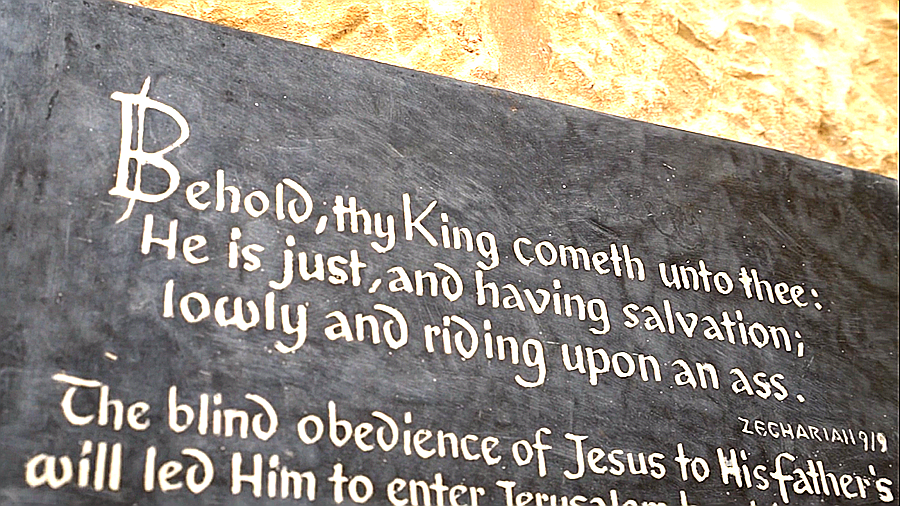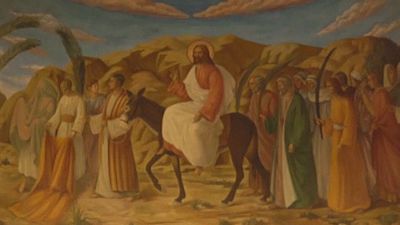Jesus said, “For judgment I have come into this world, so that the blind will see and those who see will become blind" (John 9:39).
Jesus was the Upside-Down Messiah. He refused to let the crowd force him into a role that fit the expectations of a mighty deliverer and a military conqueror. He chose to bring a different kind of kingdom, God's Kingdom, by being the very King, Jesus who became King through the cross!
- When confessed as the Messiah and Son of God, he talked about suffering and death, not reigning in power (Matthew 16:15-16, 21-23).
- He came to serve and not be served, even to the point of giving up his life to ransom the unworthy, the outcast, and the powerless (Mark 10:45).
- He took the role of a slave and washed his disciples' feet instead of having them wash his feet and wait on him (John 13:1-5; cf. Luke 22:24-27).
- He entered Jerusalem on the foal of a donkey as a prince of peace and not on a stallion as a conquering warrior (Matthew 21:4-5; Zechariah 9:9-10).
- Even though he could have called on heavenly power for deliverance from Herod and those who would crucify him (John 18:9-11), he offered his life on a cross to draw all people to him (John 12:32-33).
James Nored talks about Jesus as the unrecognizable king because he didn't fit the expectations of the people of his day:
Jesus promised to reign in his kingdom. However, Jesus insisted that his reign would bring his Kingdom to the poor in spirit, his comfort to those who mourn, the rightful inheritance of the earth to the meek, fulfillment to those who hunger and thirst for righteousness, God's mercy for those who are merciful, and his kingdom to those who are persecuted - these are the blessed ones under his rule (Matthew 6:3-10).
Power, might, revenge, and conquest are noticeably absent from Jesus' description of his kingdom. His reign ensures that sick ones are made well, poor ones find relief, the imprisoned ones are freed, the hungry ones are fed, the blind ones can see, and the lame ones can walk (Luke 4:18-21, 10:9).
No wonder most people failed to see or refused to see Jesus as God's chosen king. They were expecting a warrior, a deliverer, a mighty ruler who would cast off their political oppressors and restore their honor as a powerful nation. They couldn't - maybe it is more accurate to say, they wouldn't recognize a king who talked about the last being first, the least being greatest, and the lost being found. They weren't ready to become like children so they could enter the kingdom of King Jesus, the LORD's Christ, and their Messiah. They would not see Jesus as their king because they let their personal ideas of a king blind them to the kind of king Jesus came to be.

Of course, the real question for you and me is this: Will I follow Jesus as my king and follow him in the way of the cross?
Today, those who claim to follow Jesus want our mess of a world to reflect the way of Jesus. Unfortunately, we sometimes try to enforce this way or bring about this way, by force or political conquest. We want the power to change the way our world works without following the way Jesus chose to be Messiah. Jesus' way is the way of the cross - the way of loving surrender, full obedience to the Father's will, and selfless service to the lost and broken. We want a different kind of Messiah, so we can justify our way of bringing Jesus' kingdom. Unfortunately, many do not see Jesus any more clearly than those who were confused with why Jesus would allow himself to go to the cross.
In the Kingdom of God, there is no other way to genuine greatness than the way of surrender.
There is no path to greatness other than to kneel in service to others.
There is no other way for the Messiah to win the hearts of people than the way of the cross.
Jesus made clear that following him in the way of the cross is not optional (Mark 8:34-38). Paul reminded his beloved friends in Philippi that in their life together, they too must follow Jesus in the way of the cross (Philippians 2:5-11). You see, Jesus called us to be his people who embrace the upside-down Messiah. We are to choose the upside-down kingdom because our God that we honor as the Almighty is also the Father who gave up his Son to make us his children (John 3:16-17). This Father is forming a family that lives by their Father's set of upside-down values rooted in love (1 John 3:16-18).

Interestingly, the one person in the crowd who did recognize Jesus was king, the one who was willing to follow Jesus in the way of the cross, was a man who could not see, physically. This man was named Bartimaeus (Mark 10:46-52). He recognized Jesus was coming his way. He knew that only Jesus, the upside-down Messiah, could heal his sightless eyes. Only the cross-bound Jesus could offer him life and hope. When Bartimaeus was given his sight, he followed Jesus in the way to the cross, following his Lord down the road to Jerusalem.
Bartimaeus is our example. He is our reminder. In a world upside down to God - a world craving notoriety, power, prestige, and position - we are called to live like our Savior, the upside-down Messiah. Our King calls us to stoop, to serve, to sacrifice, and to save. When we do, we suddenly discover that we can see Jesus, and everything else, much more clearly!
Special thanks for the use of images related to Jesus' ministry from The Lumo Project and Free Bible Images for use on this week's post.












Comments
Have thoughts on this article? Leave a comment